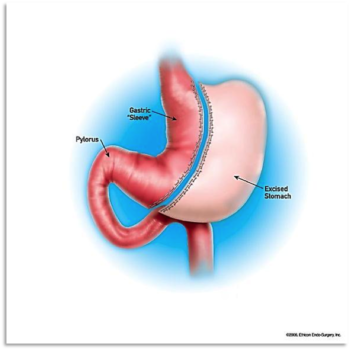Sleeve Gastrectomy

What is Sleeve Gastrectomy?
Sleeve gastrectomy, also called a gastric sleeve, is the most popular weight-loss surgery. It is performed by removing approximately 70 to 80% of the stomach. The stomach's remaining section is thin and tubular— about the size and shape of a banana. It can then hold about 2-3 ounces of food at a time so that it’s difficult to overeat. You’ll also experience fewer hunger pains because the tissue that makes the “hunger hormone,” called ghrelin, has been removed.
This surgery cannot be reversed and is a lifetime commitment.
Benefits of Gastric Sleeve Surgery
Patients who have sleeve gastrectomy typically lose up to 65 to 75% of their excess body weight. This can vary depending on your BMI before the surgery and how well the necessary lifestyle changes have been made.
In addition to the weight loss, the even better effect is the complete resolution or reduction in life-threatening conditions such as:
- Type 2 diabetes
- Heart disease including heart attacks and stroke
- High blood pressure
- Osteoarthritis caused by too much weight on the body’s joints
- Sleep apnea
- Gastroesophageal reflux disease (acid reflux)
- Infertility
- Certain types of cancer and cancer recurrence
Other advantages of this weight loss surgery procedure include no implantation of an artificial device, no re-routing of the intestinal tract, and less frequent follow-up needed. It also does not limit you from absorbing nutrients and vitamins like gastric bypass surgery can, meaning there is less chance of malnutrition.
The Gastric Sleeve Procedure
Gastric sleeve procedures are done laparoscopically. Laparoscopic procedures involve inserting small instruments through a few small incisions in the upper abdomen rather than one large incision. On average, gastric sleeve surgery lasts less than one hour. Patients are up, walking around 2 hours after the operation and started on ice chips and sips of water that night and advanced to a clear liquid diet the next day. Most patients stay in the hospital overnight and go home the following day.
The gastric sleeve differs from other bariatric surgeries:
- There is no foreign body implanted, as with the adjustable gastric band.
- There is no complex intestinal rearrangement, as with the gastric bypass.
- The sleeve gastrectomy is a permanent procedure. Unlike the adjustable gastric band and the gastric bypass, the sleeve gastrectomy cannot be reversed.
Expected Weight Loss with Sleeve Gastrectomy
The amount of weight loss varies among patients based on their lifestyle choices after surgery. On average, you can expect to lose 65-75% of excess body weight within 12 to 18 months. It is important to understand that if you do not also make healthy lifestyle changes after gastric sleeve surgery, you can gain the weight back. Healthy lifestyle changes include practicing good eating habits by making smart food choices and exercising regularly.
Talk with Dr. Howard and the registered dietitian in his office about how you can make these changes in your day to day life. He can also recommend a dietitian and experts in exercise for people after weight loss surgery. It’s important that you’re committed to these changes before you select any weight loss surgery, but especially one that cannot be reversed.
Who is Eligible for Gastric Sleeve?
Sleeve gastrectomy is an excellent choice for most patients interested in weight loss surgery. It is FDA approved for anyone over a BMI of 30. For most insurance companies the requirements are:
- You have a Body Mass Index (BMI) of 40 or higher OR You have a BMI of 35 or higher and experience severe negative health effects related to being obese.
- Psychological evaluation
- Nutrition evaluation
- You cannot achieve a healthy body weight for a sustained period, even through medically-supervised dieting and exercising
- You are willing and able to follow through with diet and exercise recommendations made by your health care team.
For more information on laparoscopic sleeve gastrectomy or to schedule a consultation with Dr. Howard, contact us today.